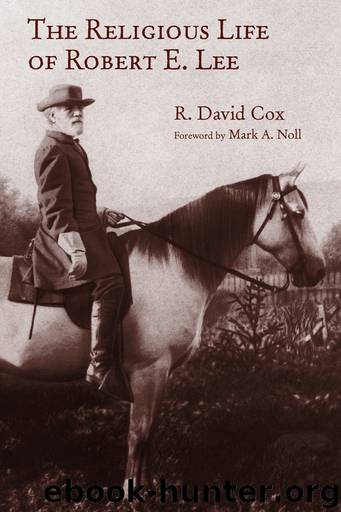The Religious Life of Robert E. Lee by R. David Cox

Author:R. David Cox
Language: eng
Format: epub
Publisher: Wm. B. Eerdmans Publishing, Co.
CHAPTER 17
“Who Teacheth My Hands to War”
The Years of Struggle
Three weeks before accepting command of Virginia’s forces, Lee commented on an essay that his daughter Mildred had composed at her school in Winchester. Evidently she had written about three professions, one of them his own. Her penmanship drew a gentle paternal rebuke. So did her orthography, which evoked a light but telling comment on the eve of war: “I noticed that you spelt Saturday with two ts (Satturday). One is considered enough in the Army, but perhaps the fashion is to have two. I hope you did justice to the Farmer the Soldier & the Sailor. The first is the most useful citizen. The two last necessary evils, which will disappear when the world becomes sufficiently Christianized, I mean the military not the commercial Sailor.”1
The outbreak of war represented, for both Robert and Mary Lee, the failure of, among others, Christians, especially leaders who claimed to be Christians. Before the war, each blamed politicians on both sides for the growing strife. After it, Mary blamed the “party of the fanatical abolitionists,” holding Lincoln especially responsible. “Even after the election of Lincoln by this faction,” she recalled in a postwar diary, “Peace might have been maintained if they had not predetermined to provoke the South to hostilities or if their chosen President had possessed the moral courage to resist the evil influences that were brought to bear upon him.”2 Now matters were in the hands of soldiers.
Neither Robert nor Mary thought war to be God’s will. When it happened, each called on the Almighty to sustain the cause they each came to support. God, they prayed, was on their side. And they had at least one Episcopal theologian who agreed with them. “It would be impiety to doubt our triumph. We are working out a great thought of GOD—, namely the higher development of Humanity in its capacity for Constitutional Liberty.”3
Lee’s wartime career has been so well recorded that only a sketch is needed here. He took command of Virginia’s military on April 22, 1861, leading it into battle for the first time on September 11 at Cheat Mountain, in what soon would become West Virginia. He then became military adviser to President Jefferson Davis in Richmond until June 1862, when he succeeded the wounded General Joseph E. Johnston as commander of the army on the Virginia peninsula. Lee renamed it the Army of Northern Virginia and remained its head through Second Manassas, Antietam, Fredericksburg, Chancellorsville, and Gettysburg, and until the end of the war. After the loss at Gettysburg, Lee tendered his resignation to Davis, who refused to accept it. Lee was promoted to general in chief of all Confederate forces in February 1865. On April 9, forced to retreat from Richmond, he surrendered to Union General Ulysses S. Grant at Appomattox.
After Lee left Arlington for Richmond in April 1861, he never again set foot in the house. Union troops occupied it. The family scattered, never fully to reunite. Each of his sons joined the Confederate army, Custis and Fitzhugh attaining the rank of general.
Download
This site does not store any files on its server. We only index and link to content provided by other sites. Please contact the content providers to delete copyright contents if any and email us, we'll remove relevant links or contents immediately.
Fanny Burney by Claire Harman(26603)
Empire of the Sikhs by Patwant Singh(23086)
Out of India by Michael Foss(16853)
Leonardo da Vinci by Walter Isaacson(13336)
Small Great Things by Jodi Picoult(7143)
The Six Wives Of Henry VIII (WOMEN IN HISTORY) by Fraser Antonia(5515)
The Wind in My Hair by Masih Alinejad(5095)
A Higher Loyalty: Truth, Lies, and Leadership by James Comey(4964)
The Crown by Robert Lacey(4817)
The Lonely City by Olivia Laing(4802)
Millionaire: The Philanderer, Gambler, and Duelist Who Invented Modern Finance by Janet Gleeson(4478)
The Iron Duke by The Iron Duke(4356)
Papillon (English) by Henri Charrière(4274)
Sticky Fingers by Joe Hagan(4199)
Joan of Arc by Mary Gordon(4112)
Alive: The Story of the Andes Survivors by Piers Paul Read(4033)
Stalin by Stephen Kotkin(3966)
Aleister Crowley: The Biography by Tobias Churton(3640)
Ants Among Elephants by Sujatha Gidla(3467)
